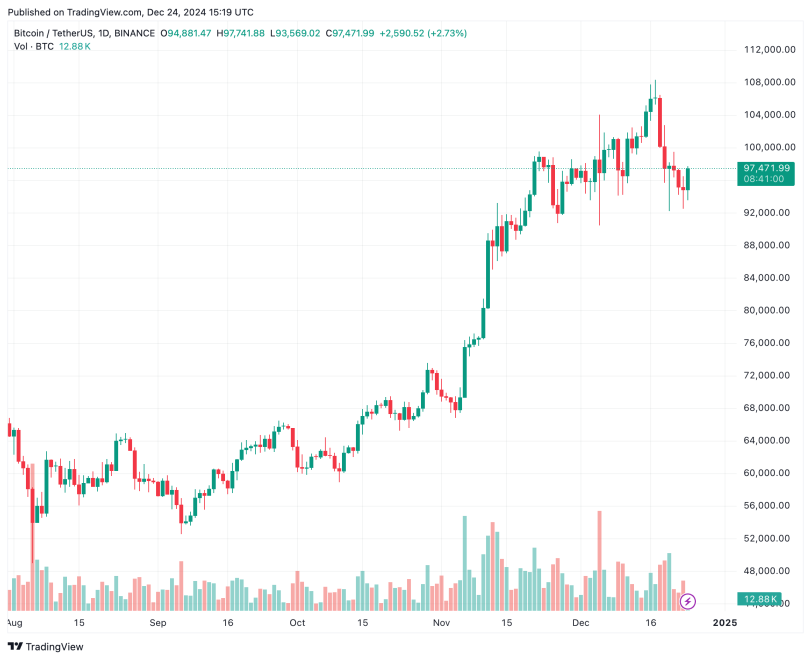- December 25, 2024
- Posted by: admin
- Category: BitCoin, Blockchain, Cryptocurrency, Investments
The US tax regulator, the Internal Revenue Service (IRS), has restated its stance on cryptocurrency staking, clarifying that rewards generated from staking activities are taxable as soon as they are received. The IRS added that staking rewards do not constitute new property, and are therefore subject to immediate taxation upon generation.
IRS Confirms Crypto Staking Taxable On Receipt
According to a recent Bloomberg report, the IRS reiterated its position that digital asset staking rewards should be taxed as income as soon as they are generated and made available to the recipient. This outcome of the case is expected to have wide-ranging implications for the treatment of staking rewards under US tax laws.
The regulator further clarified that staking does not result in the creation of new property, refuting comparisons to farming, manufacturing, or creative works. The IRS’ decision dismisses the argument that staking-generated cryptocurrency should only be taxed upon sale or exchange.
The IRS’ stance is regarding an ongoing legal dispute involving Tennessee residents, Joshua Jarrett and Jessica Jarrett. The couple – who staked cryptocurrency on the Tezos (XTZ) network – argued that their staking rewards should not be taxable until they are sold or exchanged for other assets. They contended that their rewards represented “new property,” akin to crops harvested by a farmer or a book written by an author.
However, the IRS countered that all rewards generated through staking activities constitute taxable income upon receipt. In its official statement, the agency remarked:
Revenue Ruling 2023-14 requires taxpayers who receive staking rewards to report the rewards as income at their fair market value upon having the ability to sell, exchange, or otherwise dispose of them.
For the uninitiated, crypto staking is the process of locking up cryptocurrency in a blockchain network to help validate transactions and secure the network, earning rewards in return. It typically involves proof-of-stake (PoS) or similar consensus mechanisms, allowing participants to earn passive income on their holdings.
The IRS’ 2023 guidance specifies that block rewards, including those earned through staking, are to be treated as income at the time they are generated. The tax liability for these rewards is based on their fair market value at the time of receipt, making it crucial for taxpayers to track the value of tokens as they are earned.
Background On The Tax Dispute
The Jarretts’ legal battle with the IRS began in 2021, when they filed a lawsuit over the taxation of 8,876 XTZ tokens earned as staking rewards in 2019. They argued that these rewards constituted “new property” and should not be taxed until sold or exchanged.
Drawing comparisons to farming or manufacturing, the couple asserted that staking rewards should be treated like a farmer’s crops, a manufactured good, or an author’s manuscript – taxable only upon monetization.
In response, the IRS offered the couple a $4,000 tax refund, which they declined in hopes of setting a legal precedent for all proof-of-stake blockchain networks. However, the court eventually dismissed the case, ruling it moot due to the refund.
In October 2024, the Jarretts filed a second lawsuit, seeking a tax refund of $12,179 for taxes paid in 2020 on approximately 13,000 XTZ tokens earned through staking. They also sought a permanent injunction against the IRS’ current tax treatment of staking rewards. This case is ongoing and may have broader implications for how crypto staking rewards are taxed in the US.
To say that the IRS is hounding crypto investors would be disingenuous, as the regulator has taken several measures to make it easier for taxpayers to file their crypto taxes. That said, legal forces in the US are indeed going after individuals suspected of engaging in malicious activities, including crypto tax evasion.
In related news, an individual was recently sentenced to two years in prison for failure to report capital gains from crypto sales between 2017 and 2019. At press time, Bitcoin trades at $97,471, up 4.2% in the past 24 hours.
